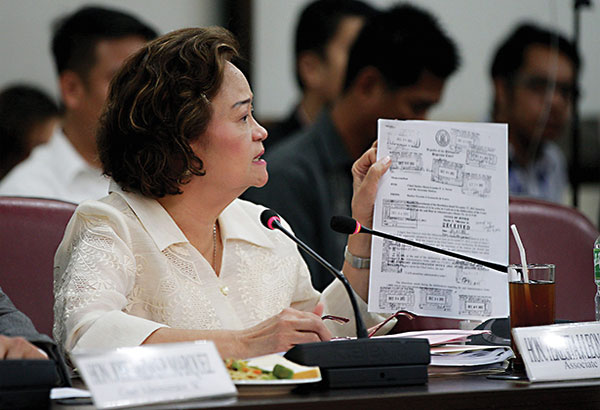SC justice accused of bias vs Sereno

The cause-oriented group Pinoy Aksyon for Governance and Environment (PAGE) believes so, accusing Associate Justice Teresita Leonardo-de Castro of “sourgraping” after being bypassed in favor of Sereno for the post of chief justice in 2012. Miguel De Guzman/File
MANILA, Philippines — Was the testimony of Supreme Court (SC) Associate Justice Teresita Leonardo-de Castro in the House impeachment proceedings against Chief Justice Ma. Lourdes Sereno motivated by ill will?
The cause-oriented group Pinoy Aksyon for Governance and Environment (PAGE) believes so, accusing De Castro of “sourgraping” after being bypassed in favor of Sereno for the post of chief justice in 2012.
PAGE convenor Bencyrus Ellorin cited De Castro’s “obvious” bias with her “litany of disagreements” against Sereno during her appearance and testimony at the House justice committee hearing last week.
“It was an obvious case of sourgraping,” Ellorin told The STAR.
Ellorin claimed that De Castro was motivated by “anger and envy” because she still could not get over her failure to be appointed chief justice “not once, but twice.”
Sereno’s lawyer Jojo Lacanilao, also one of the spokespersons for Sereno, shared their group’s opinion on the motive of De Castro in testifying before the House panel, which he explained puts into question her credibility as a witness.
“The credibility of a resource person is equally important as his actual testimony. Bias of a witness is a relevant factor in hearing testimonial evidence. A witness can be impeached by showing that he has a reason to misrepresent facts because he is biased in favor of a party, prejudiced against a party, or has an interest in the outcome,” the lawyer said in a statement.
De Castro was shortlisted twice by the Judicial and Bar Council (JBC) for the position of chief justice in 2010 and 2012.
In 2010, then president Gloria Arroyo appointed Renato Corona as chief justice. In 2012, former president Benigno Aquino III chose his first appointee to the SC, Sereno, to replace Corona who was convicted by the Senate impeachment court.
“Everyone in the legal circle knows (De Castro’s) frustration after she failed to get the nod of two appointing powers. Justice De Castro wanted to become the first female chief justice but that title went to Sereno instead,” Ellorin alleged.
With her appointment as chief justice in 2012, then 52-year-old Sereno bypassed five senior justices nominated for the post – including De Castro – to become head of the judiciary for the next 18 years, or until she reaches the mandatory retirement age of 70.
Sereno is the first woman chief justice and the second youngest ever, next to Manuel Moran, who was appointed top magistrate in 1945 at the age of 51.
Ellorin alleged that De Castro was obviously “nitpicking” at the Chief Justice and her motive was exposed during the questioning by Siquijor Rep. Ramon Rocamora at the hearing.
When asked by Rocamora how De Castro felt about the appointment of Sereno as chief justice, De Castro appeared quite defensive and admitted that her judgment might be clouded by emotion or bias, Ellorin pointed out.
Despite objections from pro-impeachment lawmakers on Rocamora’s line of questioning, De Castro said she would answer the question.
“I’ve been a justice for 20 years. I would have no right to be a justice if I were controlled by my emotions. So this appointment of Sereno, Chief Justice, what can I do? The President appointed her,” De Castro said.
De Castro testified on some of the 27 allegations raised by lawyer Lorenzo Gadon in his impeachment complaint against Sereno, including the administrative case involving Sereno’s order creating a regional court administration office in Cebu without the high court’s collegial approval.
Apart from this issue, De Castro also testified on the temporary restraining order in the case involving the disqualification of a senior citizens party-list group in the elections.
She also testified on the merits of the decision she penned that declared unconstitutional the clustering of shortlisted nominees made by the JBC last year in connection with the vacancies in the Sandiganbayan.
De Castro has also been authorized by the SC to discuss the merits of her separate concurring opinion in the August 2014 ruling that voided the JBC’s decision not to include the name of then solicitor general Francis Jardeleza on the shortlist of nominees for SC justice after Sereno raised an integrity issue against him.
The senior magistrate was joined by SC Administrator Jose Midas Marquez in testifying before the House justice committee. He discussed the administrative processes in the high court.
Apart from Justice De Castro, the House panel also invited Associate Justices Jardeleza and Noel Tijam, retired associate justice Arturo Brion, SC spokesperson Theodore Te, clerk of court Felipa Anama, and chief judicial staff officer Charlotte Labayani.
Sereno’s camp has insisted that the matters De Castro testified on pertained to differences in opinion with respect to the internal processes of a collegial body and do not constitute an impeachable offense.
They added that De Castro’s concerns could be properly addressed by the internal administration processes of the high court, not by the extraordinary remedy of impeachment.
- Latest
- Trending





























